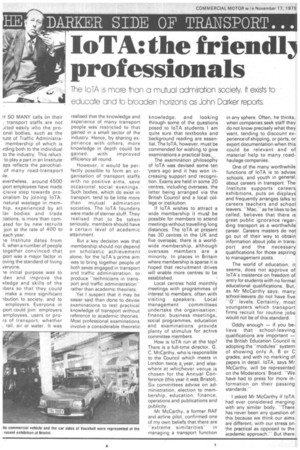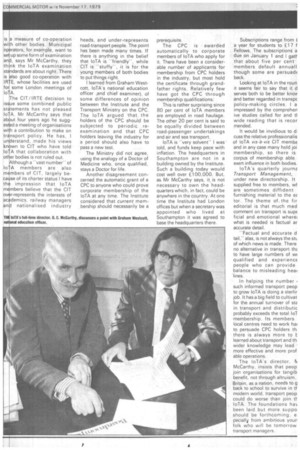IoTA: the friend13 professionals
Page 76

Page 77

If you've noticed an error in this article please click here to report it so we can fix it.
The loTA is more than a mutual admiration society. it exists to educate and to broaden horizons as John Darker report
H SO MANY calls bn their , transport staffs are not Jited easily ifito the proonal bodies, such as the tute of Traffic Administramembership of which is irding both to the individual to the industry. This reluctto play a part in an Institute aps reflects the parochialof many road-transport evertheless, around 4500 ;port employees have made .cisive step towards proonalism by joining loTA. natural wastage in memhip, experienced by all lar bodies and trade :iations, is more than cornated for by new recruits join at the rate of 400 to each year.
le Institute dates from 4., when a number of people together convinced that ,port was a major factor in oving the standard of living veryone.
-le initial purpose was to den and improve the vledge and skills of the lbers so that they could make a more significant -ibution to society, and to employers. Everyone in ;port could join: employers employees, users or prors of transport, whether , rail, air or water. It was
realised that the knowledge and experience of many transport people was restricted to that gained in a small sector of the industry. Hence, by sharing experience with others, more knowledge in depth could be gained, with improved efficiency all round.
However, it would be perfectly possible to form an organisation of transport staffs with no positive aims, save occasional social evenings. • Such bodies, which do exist in transport, tend to be little more than mutual admiration societies. The loTA founders were made of sterner stuff. They realised that to be taken seriously, members should have a certain level of academic attainment.
But a key decision was that membership should not depend on scholastic achievement alone, for the loTA's prime aim was to bring together people of both sexes engaged in transport and traffic administration, to produce "technicians in transport and traffic administration" rather than academic theorists.
Yet I suspect that it may be easier said than done to devise examinations to test practical knowledge of transport without reference to academic theories. Most professional examinations involve a considerable theoretic knowledge, and looking through some of the questions posed to loTA students I am quite sure that textbooks and background reading are essential. The loTA, however, must be commended for wishing to give examinations a practical bias., The examination philosophy of loTA was devised some ten 'years ago and it has won increasing support and recognition. Exams are held in some 20 centres, including overseas, the latter being arranged via the British Council and a local college or institution.
If loTA wishes to attract a wide membership it must be possible for members to attend meetings without travelling long distances. The loTA at present has 30 centres in the UK and five overseas; there is a worldwide membership, although' overseas members are a minority. In places in Britain where membership is sparse it is hoped that recruitment drives will enable more centres to be established.
Local centres hold monthly meetings with programmes of interest to members, often with visiting speakers. Local management committees undertake the organisation; finance, business meetings, social programmes, education and examinations provide plenty of stimulus for active committee members.
How is loTA run at the top? There is a full-time director, G. C. McCarthy, who is responsible to the Council which meets in London twice, a‘year, and elsewhere at whichever venue is chosen for the Annual Conference (this year it was Bristol). Six committees advise on administration, election to membership, education, finance, operations and publications and publicity.
Mr McCarthy, a former RAF and airline pilot, confirmed one of my own beliefs that there are "extreme similarities" in managing a transport function in any sphere. Often, he thinks, when companies seek staff they do not know precisely what they want, tending to discount experience of shipping, or ports, or export documentation when this could be relevant and of material help to many roadhaulage companies.
One of the many worthwhile functions of loTA is to advise schools, and youth in general, about careers in transport. The Institute supports careers, exhibitions, puts on displays and frequently arranges talks to careers teachers and school leavers. "Mac," as he likes to be called, believes that there is great public ignorance regar-, ding transport as a worthwhile career. Careers masters do not go out of their way to obtain information about jobs in transport and the necessary qualifications for those aspiring to management posts.
The world of education, it seems, does not approve of loTA's insistence on freedom of entry for students with no formal educational qualifications. But, as Mr McCarthy says, many school-leavers do not have five "0" levels. Certainly, most youngsters which transport firms recruit for routine jobs would not be of this standard.
Oddly enough — if you believe that school-leaving qualifications are important — the British Education Council is adopting the "modules" system of showing only A, B or C grades, and with no marking of papers in detail. loTA, says Mr McCarthy, will be represented on the Moderators' Board. "We have had to press for more information on their passing standards."
asked Mr McCarthy if loTA had ever considered merging with any similar body. "There has never been any question of this because we think our aims are different, with our stress on the practical as opposed to the academic approach.But there
''S ivvi 'op se an th St is IR fo lo is St lo ab es wi tr un kn lo ot 10 rrl Ca th ov ac an a measure of co-operation h other bodies. Municipal rators, for example, want to up some form of examination says Mr McCarthy, they nk• the loTA examination ndards are about right. There 'so good co-operation with E, whose facilities are used some London meetings of A.
The CIT/IRTE decision to ue some combined public ternents has not pleased A. Mr McCarthy says that ut four years ago he sugged a meeting of organisations h a contribution to make on nsport policy. He has, I erstand, made his views wn to CIT who have told A that collaboration with er bodies is not ruled out. Ithough a "vast number' of A members are also mbers of CIT, largely bese of its charter status I have impression that loTA mbers believe that the CIT r-represents the interests of demics, railway managers nationalised industry
heads, and under-represents road-transport people. The point has been made many times. If there is anything in the belief that loTA is "friendly—, while CIT is "stuffy'', it is for the young members of both bodies to put things right.
I learned from Graham Westcob, loTA's national education officer -,and chief examiner), of some differences of opinion between the Institute and the Transport Ministry on the CPC. The loTA argued that the holders of the CPC should be subjected to periodic reexamination and that CPC holders leaving the industry for a period should also have to pass a new test.
The Ministry did not agree, using the analogy of a Doctor of Medicine who, once qualified, stays a Doctor for life.
Another disagreement concerned the automatic grant of a CPC to anyone who could prove corporate membership of the loTA at any time. The Institute considered that current membership should necessarily be a
prerequisite.
The CPC is awarded automatically to corporate members of loTA who apply for it. There have been a considerable number of applicants for membership from CPC holders in the industry, but most hold the certificate through grandfather rights. Relatively few have got the CPC through membership qualifications: This is rather surprising since 30 per cent of loTA members are employed in road haulage. The other 20 per cent is said to be equally divided between road-passenger undertakings and air and sea transport.
loTA is "very solvent" I was told, and funds keep pace with inflation. The headquarters in Southampton are not in a building owned by the Institute. Such a building today would cost well over £.100,000. But, as Mr McCarthy says, it is not necessary to own the headquarters which, in fact, could be anywhere in the country. At one time the Institute had London offices but when a secretary was appointed who lived at Southampton it was agreed to base the headquarters there.
Subscriptions range from a year for students to E.17 f Fellows. The subscriptions a due on January 1 and I gatlthat about five per cent members default annuall though some are persuadE back.
Looking at loTA in the roun it seems fair to say that it d serves both to be better knov and better regarded in transpc policy-making circles. I a impressed by the comprehen ive studies called for and tl wide reading that is recor mended.
It would be invidious to di cuss the relative professional is of loTA CIT mernbe and in any case many hold joi membership, so there is corpus of membership able exert influence in both bodies.
loTA's quarterly journa Transport Management, under new directorship. It supplied free to members, wh are sometimes diffident furnishing material to the ec tor. The theme of, the fir editorial is that much med comment on transport is sup€ ficial and.emotional where; what is needed is factual ar accurate detail.
"Factual and accurate d tail," alas, is not always the sti_ of which news is made. There no alternative in transport thE• to have large numbers of WE qualified and experiencE people who can provide balance to misleading heai lines.
• In helping the number such informed transport peop to grow loTA is doing a sterlir job. It has a big field to cultivat for the annual turnover of ste in transport and distributic probably exceeds the total loT membership. Its members local centres need to work hai to persuade CPC holders th -there is always more to learned about transport and th wider knowledge may lead • more effective and more prof able operations.
The loTA's director, N McCarthy, insists. that peop join organisations for tangib benefit, not through altruism. Britain, as a nation, needs to g back to school to survive in th modern world, transport peop could do worse than join th• loTA. The foundations haN. been laid but more suppo should be forthcoming, e pecially from ambitious your folk who will be tomorrow transport managers.




























































































































































